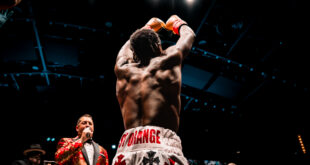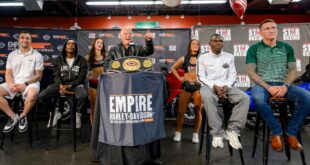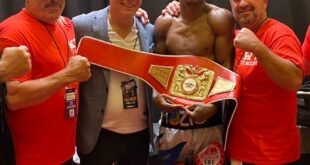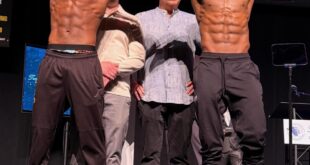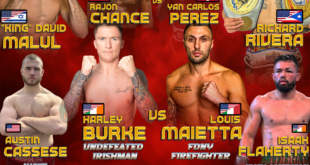Chris Sanigar’s West Country Boxing Promotions presents a stellar night at the fights this Thursday at the Dolman Exhibition Hall in Bristol, England as an evening with American boxing legend Rubin “Hurricane” Carter kicks off the event. Four bouts then follow, featuring light heavyweight Leigh Alliss against Varuzhan Davtyan, super middle Dan Gutherie meeting Marko Doknic and light welter Gary Buckland squaring off with Bheki Moyo as well as an appearance by light welter Ali Wyatt. Box office 0117-949-6699.
In a message dated 11/15/2005 6:06:25 AM Eastern Standard Time, C Sanigar writes:
Date: THURSDAY 17 NOVEMBER 2005
Venue: DOLMAN EXHIBITION HALL, BRISTOL
Doors Open: 20:45
First Bell: 21.00
FIGHTCARD
4 x 3 Minute Rounds Light Heavyweight Contest
Leigh Alliss (Stroud) v Varuzhan Davtyan (Birmingham)
4 x 3 Minute Rounds Super-Middleweight Contest
Dan Guthrie (Bristol) v Marko Doknic (Liverpool)
4 x 3 Minute Rounds Light Welterweight Contest
Ali Wyatt (Torquay) v TBA
4 x 3 Minute Rounds Light Welterweight Contest
Gary Buckland (Cardiff) v Bheki Moyo (London)
In 2000, a movie about Carter’s life, The Hurricane, was made starring Denzel Washington as Carter.
Rubin “Hurricane” Carter (born May 6, 1937) was a middleweight contender in the sport of boxing during the 1960s, whose subsequent life has been raged with controversy to this day. To some, Carter is a glaring example of the racism that existed in the United States during that time and he is viewed as an individual who was sentenced to prison for crimes they believe he never committed. Carter grew up in a racially-charged atmosphere in Paterson, New Jersey and had experiences growing up that affected him for the rest of his life.
Carter joined the United States Army. After basic training at Fort Jackson, he was shipped to Germany. Carter became interested in boxing during this time and won several service bouts. His aggressive style and frequent appearances in the ring (he sometimes fought twice a month), drew attention and he quickly established himself as a contender. When he decisioned perennial contender Holley Mims in 10 rounds on December 22, 1962, he entered Ring Magazine’s list of the top 10 middleweights in the world. The accolades for Carter, who was now known by his nickname of Hurricane Carter, continued in 1963. He fought six times, all against top-notch opposition, winning four and losing two. He remained ranked in the lower regions of the top 10 until his last fight, on December 20 of that year, when he shocked everyone by knocking out past and future world champ Emile Griffith in the first round.
That win made Carter the No. 1 contender for Joey Giardello’s world middleweight title. He won two more fights, in one of these he won a decision against future Heavyweight Champion Jimmy Ellis, and then challenged Giardello on December 14, 1964 in Philadelphia. Carter fought well but Giardello won a 15-round unanimous decision 72-66 | 69-64 | 70-67 . Ring Magazine did not find the fight controversial and most of the press agreed with the judges. Carter was gracious in defeat and did not protest the judging.
In June of 1966, Carter was arrested on suspicion of being involved in a triple murder at the Lafayette Grill in downtown Paterson. Although an eyewitness injured in the shooting said that Carter was not involved in the crime, he was convicted of it and sentenced to life in prison. He continued to maintain his innocence, however. He won a retrial on the charges in 1976, but he and his alleged accomplice, John Artis, were again convicted and Carter resentenced to life. Carter and his supporters continued to fight the conviction, accusing the Paterson police of a racist conspiracy against Carter. Finally, in 1985, Carter was freed when an appellate judge ruled that he had not received a fair trial. This time, prosecutors chose not to try Carter a third time, and he has been free ever since.
In 2000, a movie about Carter’s life, The Hurricane, was made starring Denzel Washington as Carter.
Bob Dylan wrote a song about the incident called “Hurricane”. The song took the view that Carter had been falsely tried.
 Boxing News Boxing News
Boxing News Boxing News
